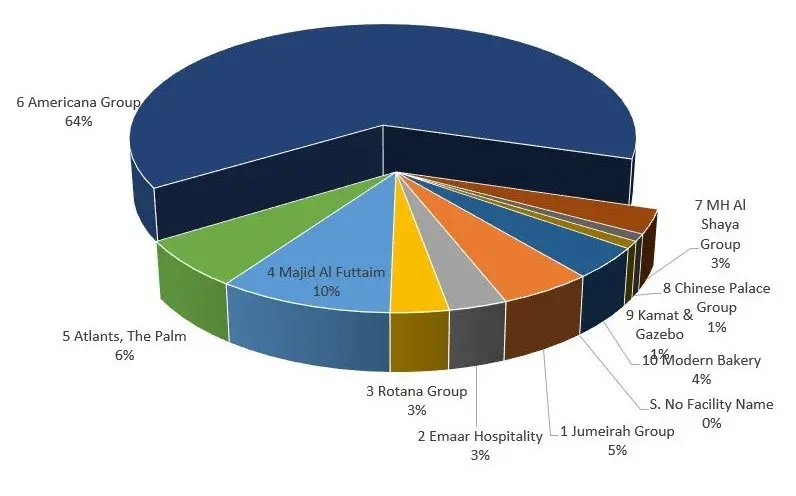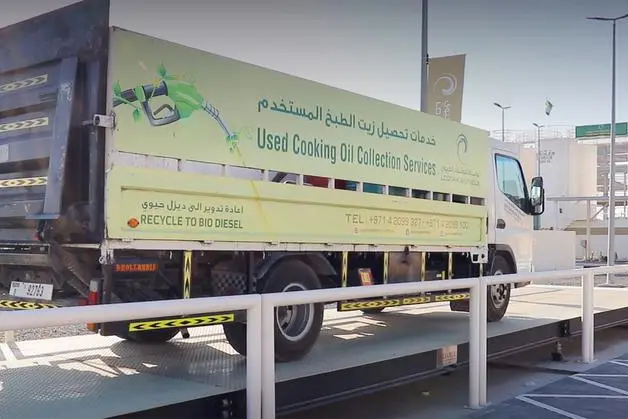PHOTO
Dubai, United Arab Emirates: Lootah Biofuels, a leading circular economy company producing biofuel from cooking oil in the UAE, has highlighted its partnerships in providing used cooking oil for recycling and biofuel production and the combined role of its partners in the UAE's sustainability efforts, which reflects the world's confidence in the country's leadership in this area and to host COP 28 at Expo City Dubai from 30 November to 12 December 2023.
Lootah Biofuels Company stated that the contribution of ten largest partners contribute up to 160,000 litres of waste cooking oil per month, which the company uses to produce biofuels to power transport vehicles, contributing achievements that are in line with the goals of a circular, innovative and sustainable economy.
The company partners with some of the leading national and international brands operating in the UAE, including Jumeirah Group, Emaar Hospitality, Rotana Group, Majid Al Futtaim, Atlantis The Palm, Americana Group, Alshaya Group, Chinese Palace Restaurant Group, Kamat & Gazibo Restaurants and Modern Bakery.


any of these partners have been working with Lootah Biofuels since the inception of the plant, which is supported by several UAE government agencies and institutions, including Roads and Transport Authority, Dubai Municipality and Dubai Police, all of which aim to promote and stimulate initiatives focused on sustainable development.
Yousif bin Saeed Lootah, CEO of Lootah Biofuels, expressed his gratitude and appreciation to the partners and said, "Working with partners is crucial in supporting projects that focus on sustainability. Lootah Biofuels is working on expanding its network of partners to collect, process and convert waste cooking oils into biodiesel fuel using innovative technologies at a competitive price point compared to regular diesel fuel, especially for commercial transportation like trucks and buses. This will considerably reduce emissions and provide environmentally friendly energy solutions, which aligns with the UAE's directions for fighting climate change and global warming."
Lootah stressed that the company "continues to expand the circle of partners from institutions and companies operating in the food and hospitality sector, as the biofuel plant helps to improve their integrated waste management processes and drive the transition to a circular economy model with high efficiency, as Lootah Biofuels is one of the largest collectors of waste cooking oil."
The production of biofuels from used cooking oils is one of the best options in terms of sustainability and benefits under the circular economy, as appropriate collection and recycling initiatives contribute to reducing pollution, conserving natural resources and addressing the negative environmental impacts associated with the disposal of used cooking oils, such as pollution of water, soil and air, and impact on the wildlife and severe effects on wastewater systems.
Cooking oils have the highest carbon reduction of all feedstocks available for biodiesel, making biofuel production and remain an innovative and practical solution. Biofuels produced from waste cooking oil are superior lubricants that extend the life of the car engine and can be used without significant modifications, as most car manufacturers allow diesel (B5) with a 5% blending rate.
With its specially designed fleets, Lootah Biofuels collects waste cooking oil from restaurants and bakeries. This is an incentive for them not to dispose of the oils in a way that negatively impacts people and the environment or to reuse them in the food chain.
Lootah Biofuels' focus aligns with the UAE Energy Strategy, which aims to increase the share of clean and sustainable energy sources in the country's energy mix.
Lootah Biofuels currently has a production capacity of 60 million litres of biofuel per year. With the upcoming new plant in Abu Dhabi this year, the capacity is expected to go up to around 100 million litres per year, which will help meet the growing energy demand of the transport sector with clean alternatives.
The company explained that the low cost of the biofuel it produces contributes to optimising the operational expenses of many company fleets, thereby lowering product & service prices for the end customer, as transport is an essential factor in the prices of various products. Yousif further stressed the need for stabilising biofuel prices while increasing the demand factor and promoting innovation in the production of biofuels.
-Ends-
About Lootah Biofuels:
Lootah Biofuel Company was established in Dubai in 2010 to meet the growing demand for alternative fuels in the region and in line with the UAE's vision for sustainable development. Lootah Biofuel Company aims to provide and innovate long-term sustainable solutions to energy needs. By rapidly expanding production capacity, improving distribution channels and redefining biodiesel quality, Lootah Biofuels will further expand access to sustainable and environmentally friendly biofuels
Media Contact:
Salah Al Tamimi - salah@blueappleco.com
Hiba Alamin - hiba@blueappleco.com




















